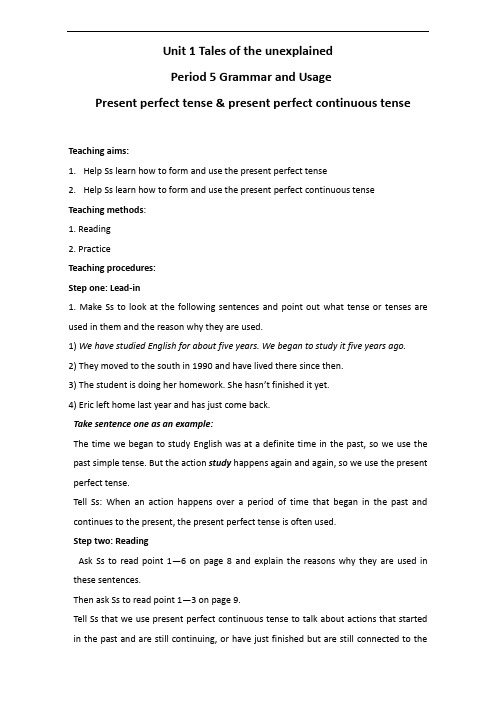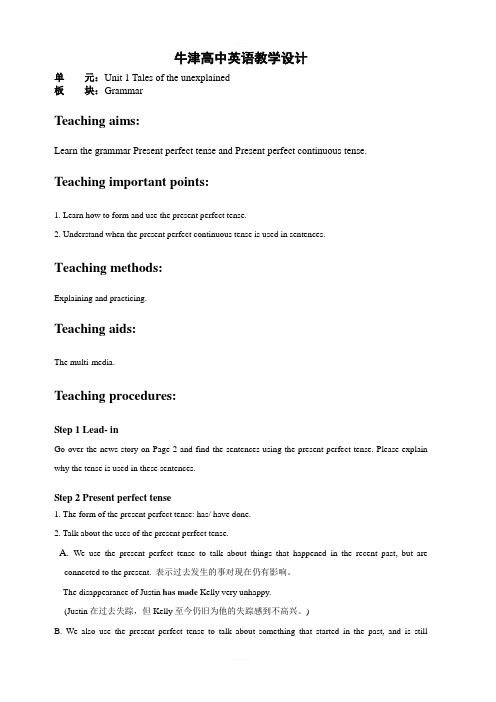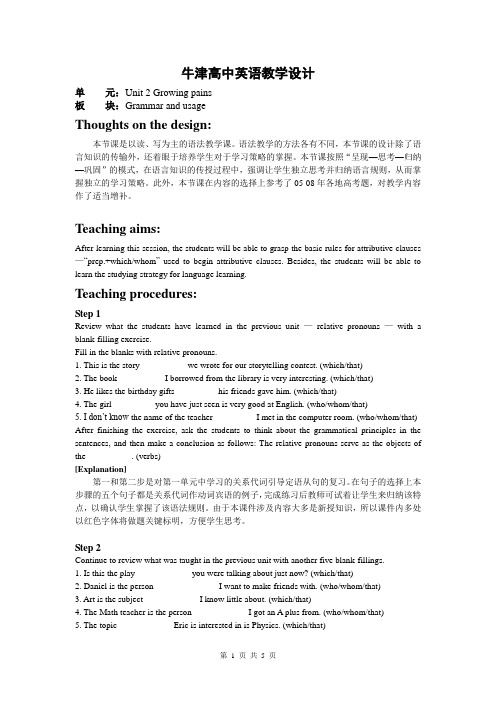牛津译林版英语必修二Unit1Grammarandusage1教案
2018-2019学年高中英语(译林牛津版)必修二教案 Unit 1 Tales of the unexplained Grammar and usage 教案

Unit 1 Tales of the unexplainedPeriod 5 Grammar and UsagePresent perfect tense & present perfect continuous tenseTeaching aims:1.Help Ss learn how to form and use the present perfect tense2.Help Ss learn how to form and use the present perfect continuous tenseTeaching methods:1. Reading2. PracticeTeaching procedures:Step one: Lead-in1. Make Ss to look at the following sentences and point out what tense or tenses are used in them and the reason why they are used.1) We have studied English for about five years. We began to study it five years ago.2) They moved to the south in 1990 and have lived there since then.3) The student is doing her homework. She hasn’t finished it yet.4) Eric left home last year and has just come back.Take sentence one as an example:The time we began to study English was at a definite time in the past, so we use the past simple tense. But the action study happens again and again, so we use the present perfect tense.Tell Ss: When an action happens over a period of time that began in the past and continues to the present, the present perfect tense is often used.Step two: ReadingAsk Ss to read point 1—6 on page 8 and explain the reasons why they are used in these sentences.Then ask Ss to read point 1—3 on page 9.Tell Ss that we use present perfect continuous tense to talk about actions that started in the past and are still continuing, or have just finished but are still connected to thepresent in some way.Examples: I’ve been waiting for an hour and he still has n’t turned up.I’m so sorry I am late. Have you been waiting long?Step three: Difference between Present perfect or present perfect continuous Ask Ss to read point 1-4 on page 10 and know the difference between them. Step four: Practicea)Ask Ss to finish doing part A & B on page 11.b)Ask Ss to finish Part C on page 88.。
牛津译林版英语必修二Unit1Grammarandusage1教案

牛津高中英语教学设计单元:Unit 1 Tales of the unexplained板块:GrammarTeaching aims:Learn the grammar Present perfect tense and Present perfect continuous tense. Teaching important points:1. Learn how to form and use the present perfect tense.2. Understand when the present perfect continuous tense is used in sentences.Teaching methods:Explaining and practicing.Teaching aids:The multi-media.Teaching procedures:Step 1Lead- inGo over the news story on Page 2 and find the sentences using the present perfect tense. Please explain why the tense is used in these sentences.Step 2 Present perfect tense1. The form of the present perfect tense: has/ have done.2. Talk about the uses of the present perfect tense.A. We use the present perfect tense to talk about things that happened in the recent past, but areconnected to the present. 表示过去发生的事对现在仍有影响。
英语-高中-必修2-牛津译林版-Unit 1全套课件:U1_Grammar and usage

that he
did an important and necessary job.
3. A noun clause can be used as the
predicative after the link verb be.
• 1) The question is whether we can rely on him.
• 4) I’ll keep the promise that I will
Noun clauses beginning with
that
• that引导肯定含义的从句,在从句中不充 当成分,没有实际意思。
• 在非正式英语中,以下情况中that可以省 略:
动词后的宾语从句中 be动词后的表语从句中
•
2. A noun clause can be used either as the object of a verb or a preposition in a
sentence.
• 1) They know that the habit will kill them.
• 2) He asked how much I paid for the violin.
• 2) That’s because we were in need of money at that time.
• 3) He looked as if he was going to cry.
• 4) That’s why I was late.
4. Explain to students what apposition
Introduction to noun clauses
译林牛津版必修二:Unit 2 Grammar and usage(1)教学设计

2) Iwill be ridingthe bus at 11:30
3) At this time next year, I'll be scuba diving offMexico.
4) Whatwillyoube doingwhen new year arrives?
pare the following sentences, and find the differences between them.
1) Toby will be climbing in the Himalayas all next week.(the action climbing in theHimalayaswill be a continuous activity next week and Toby will probably not do other things.)
科目
年级
班级
时间
课题
Module 2 Unit 2Grammar and usage
第课时
教学目标
Learn the grammar ‘Future continuous tense
重点
Use the future continuous tense correctly.
难点
Differ the various kinds of tense clearly.
Continuous Tenses always engage the verb "BE," which expresses the timeframe of the action in progress. The main verb is always in the continuous form (ING).
Unit1GrammarandUsage句子成分和结构课件高中英语牛津译林版(2020)

基本句型一 主+谓
① The sun rises. ② Time flies. ③ The man smokes heavily. ④ They stopped when the phone was ringing. ⑤ They talked for half an hour. Conclusion: 这类动词叫做 不及物动词 , 后面不跟宾语,但 是可以带状语。
系动词分类
1) 表状态的be动词:be,is,am,are,was,were 2)表感官的动词: look, sound, taste, smell, feel, 3)表变化的动词: 4)表持续的动词: remain, stay, keep, continue 5)表表像的动词: seem, appear (似乎,好像) 6)表终止的动词: prove, turn out(证明 always makes his parents angry.
A
D定
状 频率
B
定
C
补
英语中一共两种修饰成分:
修饰名词的叫“定语” 修饰名词以外的其他成分的统统叫“状语”
Leona
Practice 学法P26-30
Leona
P6 A Exploring the rules: 1. I agree. 2. Setting goals gives you a focus. 3. These habits will be helpful. 4. Setting goals makes you more confident. 5. You will live a happy life.
现在分词 doing
They found the house broken in.
Unit1Grammarandusage课件牛津译林版高中英语选择性必修第二册

... he had become a publisher. He used the same business strategy he had employed at the St Louis Post-Dispatch ...
16
P6
Working out the rules
• We often use the past perfect tense to talk about something that happened (1) __b_e_f_o_r_e__ (before / after) a past time.
观点,政见
vt.谴责,控诉 n.税,税款 vt.对…征税,使纳税
9
mount
mount up elevation profession
drama scholarshvt.攀登,爬上 n.山 (尺寸和数量上)增加,上升 n.提高;提升;海拔 n.行业,职业;同行;宣称,声明 n.戏剧;戏剧性事件 n.奖学金;学术 n.类别,种类 adv.尽管如此
19
P7
3 For the time he was 25, Pulitzer had become a journalist and publisher. _h_a_d__b_e_c_o_m_e__→__b_e_c_a_m__e___________________
4 Many of the best reporters have worked for his paper before its failure in 1931. _h_a_v_e_→___h_a_d______________________________
② Before I could say “thank you”, he had run away. 我还没来得及说“谢谢”,他就跑开了。
译林版高中英语选必二Unit1 Grammar and usage 教案

《英语》(选择性必修·第二册)Unit 1 The mass mediaGrammar and usageI. L earning objectivesBy the end of the lesson, the students will be able to:1. learn about the definition and the verb form of past perfect tense;2. summarize the grammatical rules of past perfect tense;3. apply the rules in new situations appropriately.II. Key competence focusDevelop the thinking ability by analyzing and summarizing the grammar rules.III. Predicted area of difficulty1. How to use past perfect tense freely and properly in their writing and speaking.2. Explore the rules of past perfect tense.IV. Teaching proceduresStep 1 Warming up1.T asks the Ss to read part A on page 6 and complete the True or False exercise.1)He regularly visited the library and studied English and Law---by then he had learnt very little French. ( )2)By the age of 25, he had become a teacher. ( )3)He used the same business strategy he employed at the St Louis Post-Dispatch and sales of the newspaper mounted up until it was the bestselling newspaper in the country. ( ) 2.T asks the Ss the following questions1)When and where was Joseph Pulitzer born?Suggested answer: Joseph Pulitzer was born on April 10, 1847, in Hungary.2)When did Joseph Pulitzer found the newspaper the St Louis Post-Dispatch?Suggested answer: In 1878.3)In 1892, what did he offer Columbia University money to start?Suggested answer: He offered Columbia University money to start a school of journalism.4)When were the first Pulitzer Prizes were awarded?Suggested answer: Six years after Joseph Pulitzer’s death.【设计意图: 老师一开始通过分享Joseph Pulitzer的生活故事,设置对与错以及回答问题的练习让学生在具体的情境中提前感知本节课的语法知识。
牛津译林版英语必修一Unit2Grammarandusage1教案

牛津高中英语教学设计单元:Unit 2 Growing pains板块:Grammar and usageThoughts on the design:本节课是以读、写为主的语法教学课。
语法教学的方法各有不同,本节课的设计除了语言知识的传输外,还着眼于培养学生对于学习策略的掌握。
本节课按照“呈现—思考—归纳—巩固”的模式,在语言知识的传授过程中,强调让学生独立思考并归纳语言规则,从而掌握独立的学习策略。
此外,本节课在内容的选择上参考了05-08年各地高考题,对教学内容作了适当增补。
Teaching aims:After learning this session, the students will be able to grasp the basic rules for attributive clauses —“prep.+which/whom”used to begin attributive clauses. Besides, the students will be able to learn the studying strategy for language learning.Teaching procedures:Step 1Review what the students have learned in the previous unit —relative pronouns —with a blank-filling exercise.Fill in the blanks with relative pronouns.1. This is the story __________ we wrote for our storytelling contest. (which/that)2. The book __________ I borrowed from the library is very interesting. (which/that)3. He likes the birthday gifts _________ his friends gave him. (which/that)4. The girl _________ you have just seen is very good at English. (who/whom/that)5. I don’t know the name of the teacher _________ I met in the computer room. (who/whom/that) After finishing the exercise, ask the students to think about the grammatical principles in the sentences, and then make a conclusion as follows: The relative pronouns serve as the objects of the __________. (verbs)[Explanation]第一和第二步是对第一单元中学习的关系代词引导定语从句的复习。
- 1、下载文档前请自行甄别文档内容的完整性,平台不提供额外的编辑、内容补充、找答案等附加服务。
- 2、"仅部分预览"的文档,不可在线预览部分如存在完整性等问题,可反馈申请退款(可完整预览的文档不适用该条件!)。
- 3、如文档侵犯您的权益,请联系客服反馈,我们会尽快为您处理(人工客服工作时间:9:00-18:30)。
牛津高中英语教学设计
单元:Unit 1 Tales of the unexplained
板块:Grammar
Teaching aims:
Learn the grammar Present perfect tense and Present perfect continuous tense. Teaching important points:
1. Learn how to form and use the present perfect tense.
2. Understand when the present perfect continuous tense is used in sentences.
Teaching methods:
Explaining and practicing.
Teaching aids:
The multi-media.
Teaching procedures:
Step 1Lead- in
Go over the news story on Page 2 and find the sentences using the present perfect tense. Please explain why the tense is used in these sentences.
Step 2 Present perfect tense
1. The form of the present perfect tense: has/ have done.
2. Talk about the uses of the present perfect tense.
A. We use the present perfect tense to talk about things that happened in the recent past, but are
connected to the present. 表示过去发生的事对现在仍有影响。
The disappearance of Justin has made Kelly very unhappy.
(Justin在过去失踪,但Kelly至今仍旧为他的失踪感到不高兴。
)
B. We also use the present perfect tense to talk about something that started in the past, and is still
happening now.表示过去开始的动作一直延续到现在。
I have not seen Justin since last Friday night.(从上周五晚上到现在一直都没有见到过。
)
C. We use the present perfect tense when the exact time of an action is not clear or important. We use it with time expressions such as:
already ever for just lately never recently since yet
Exercise: Complete the following sentences with the proper tense.
(1) We have studied (study) English for about five years.
(2) They have lived (live) in the south since their daughter was born.
(3) I have read (read) your article three times. It’s well written.
(4) The student has finished (finish) her homework already.
(5) Eric has just gone (go) back to his hometown.
We use already for affirmative statements and yet for negative statements.
We use for + a period of time and since + a point in time.
D. We use the present perfect tense to talk about actions that were completed only a short time ago. In this case, just is used. Pay attention to the position of just.
The police have just finished searching the area.
E. We can also use the present perfect tense for repeated actions, that is, we use the present perfect tense with the time expressions once/twice/three times…
3. Read the diary entry and then complete it using the correct forms of the verbs in brackets. Answers: (1) saw (2) has visited (3) loves (4) hasn’t visited (5) has swum (6) has never met (7) has dived (8) has found (9) hasn’t found (10) Has, been
Step 3 Present perfect continuous tense
1. The form of the present perfect continuous tense: have / has been doing
2. Talk about the uses of the present perfect continuous tense
A. We sometimes use the Present perfect continuous tense to talk about actions that started in the past and are still continuing. 表示过去开始的动作一直延续到现在并仍在继续之中。
I have not been sleeping well since I returned home.
“我”回家后一直都没有睡好,现在也没有睡好。
B. We also use the present perfect continuous tense to talk about actions that have just finished but are still connected to the present in some way. 表示过去开始的动作刚结束并在某种情况下与现在有关联。
Kelly:Sorry I'm late.Have you been waiting long?
Sally:Yes.I have been waiting for an hour.
凯利刚到,对方虽然不再等了,但已一直等到现在。
3. Fill in the missing words on page 9
Answers: (1) have been talking (2) have been taking (3) have been watching
(4) have seen (5) have been writing
Step 4 Homework
1. Prepare Grammar and usage on page 10-11.
2. Finish Part C1 and C2 on page 88 in Workbook.。
